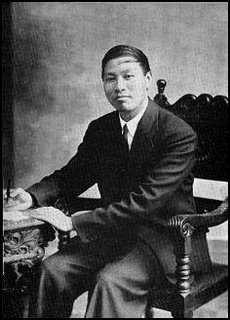 |
| English: Photo of Watchman Nee 中文: 倪柝聲的照片 (Photo credit: Wikipedia) |
Watchman Nee
(November 4, 1903 – May 30, 1972) Chinese Christian who became a
leader in the Church in China by beginning the use of homes for meeting. He
started the home meetings in the 1920s when he was only 17. He was the ninth
child of a second generation Christian family in Foochow China. He had been
dedicated to the Lord by his mother before his birth. He was exceptionally intelligent
and excelled in school graduating from Anglican Trinity College but he did not
attend theology school gaining his extensive knowledge by reading widely while
practicing dedicated spiritual exercises. In the early years he divided his
money into three classes: one third he spent on his own needs, one third he
gave to help others and one third he used for the purchase of books. He
accumulated three thousand volumes over his lifetime. He had an unusual ability
to glean facts and retain information from reading. He also exhibited
determination in learning to apply spiritual truths.
When he was
a teenager he fell in love with Charity Chang,the daughter of an old
family friend. She was not a Christian at the time and ridiculed Jesus in Watchman’s
presence. He struggled with it but decided to end their relationship. Ten years
later after she had completed college she attended meeting in Shanghai. She had
become a Christian and during one of his conferences, they were married. He
suffered greatly with chronic illnesses through which she attended him.
His ministry
began in personal study to understand and practice the consecrated life, and
his vision was for home churches to become
a true unity of spirits. He rejected
the denominational boundaries he felt were detrimental to spiritual unity. He traveled to the United States and England, but his mission was directed toward
China.
After his marriage Charity nursed and support him during his frequent illnesses. He suffered for about ten years with Tuberculosis and later with a
severe stomach disorder and very painful angina pectoris.
In 1942 he
left his ministry to help his brother’s failing business.
By 1948 he turned the
business over to the church and resumed his
ministry again. In 1949 the
Communist Party gained control in
China and the Christian Church came under
severe persecution. He
was arrested in 1956 and accused of many false crimes
including
tax evasion, bribery, and cheating on government contracts. He
spent
the last twenty years of his life in prison. Only Charity was
allowed to visit
him. Charity died in 1971 and he followed her in
May of 1972.
His writings
continue to inspire Christians all over the world. His
grandniece was given
access to a note left under his pillow which
she memorized and reported. She said it was written in a large unsteady hand. It
said: Christ is the Son of God who died for the redemption of sinners and resurrected after three
days. This is
the greatest truth in the universe. I die because of
my belief in Christ.
Watchman Nee."
This information was gleaned from Wikipedia.


